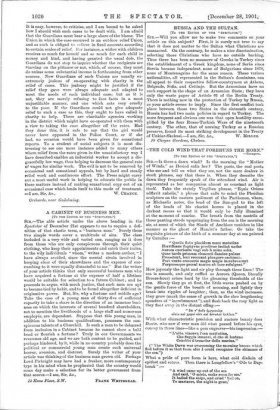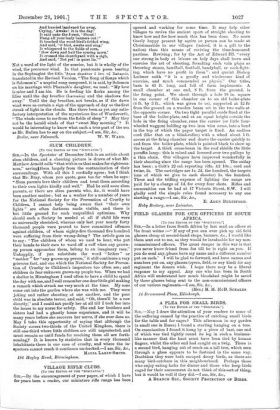"THE COLD WIND THAT FORERUNS THE MORN."
—Tennyson.
[TO THE EDITOR OP THE "SPECTATOR."]
Si,—Is there a dawn wind? Is the morning the "Mother of Winds." as Hesiod calls her ? The poets, the real poets who see and tell us what they see, not the mere dealers in stock phrases, say that there is. When they describe the , dawn they frequently speak of the attendant wind. Air is represented as her companion almost as constant as light itself. Take the stately Tirgilian phrase, " Equis Oriens adflavit =hells," a phrase that calls to mind the Pheidian sculpture on the eastern pediment of the Parthenon, where, '
as Michaelis notes, the head of the Sun-god to the left of the heads of his chariot horses is placed in the darkest recess so that it would only be fully illumined ' at the moment of sunrise. The breath from the nostrils of those panting steeds upspringing from the sea is the morning air, at scent of which the Shade of Anchises vanishes in like manner as the ghost of Hamlet's father. Or take the exquisite picture of the birth of a summer day at sea painted• by Catullus :—
"ualis flatu placidum mare matutino Horrific:ins Zephyrus proclivas incitat undas Aurora exoriente vagi sub h mina soils, quae tarde primum clementi flamine pulsae Procedunt, leni resonant plangore cachinni ; Post vento crescents maps magis increbrescnnt Purpureaque procul nantes ab luce refulgent."
How joyously the light and air play through these lines! The sea is smooth, and only raffled as Aurora (Queen, literally Breeze-hour) arises hard by the gleaming thresholds of the sun. Slowly they go at first, the little waves pushed on by the gentle force of the breath of morning, and lightly they break into ripples of laughter; then, as the wind increases, they grow (mark the sense of growth in the slow lengthening spondees of " increbrescnnt "), and flash back the rosy light as they float awey in the distant ofrieg :—
" Sag T' iorn ilpg7EVEiDT olea Kul xopo: figs xal lwroAal jeAloto."
With what characteristic precision and austere beauty does ' Dante. who saw if ever man did what passed before his eyes, - convey in three lines—like a gem engraver—his impression :—
"L'alba vinceva rora mattutina, • Che fuggia innanzi, sl che di lontano Conobbi iltreinolar della marina."
(" The White Dawn was overcoming the morning breeze which fled before it so that from afar I could recognise the shimmer of the sea.")
What a pride of pure form is here, what cold disdain of epithet and colour. Then there is Longfellow's "Ode to Day- break "
"A wind came up out of the sea
And said, '0 mists, make room for me.'
It hailed the ships, and cried Sail on,
Ye mariners, the night is gone,' And hurried landward far away, Crying, 'Awake! it. ia the day.' It said unto the forest, 'Shout! Hang all your leafy banners out !' It touched the wood-bird's folded wing, And said, 0 bird, awake and sing.' It whispered to the fields of corn, 'Bow down and hail the coming morn.' It crossed the churchyard with a sigh, And said, Not yet! in quiet lie."
Not a word of the light of the sunrise, but it is wholly of the
wind, the precursor wind. In that passionate poem bearing hi the Septuagint the title, ?Aetna cialActmor iort -4; MicA6iich
translated in the Revised Version, "The Song of Songs which is Solomon's," a nuptial song composed, it is said, by Solomon on his marriage with Pharaoh's daughter, we read : "My love
is mine and I am his. He is feeding his flocks among the lilies until the day breathes (hroca-vitiap) and the shadows flee away." Until the day breathes, not breaks, as if the dawn
wind were as certain a sign of the approach of day as the first streak of light in the clouds. Has there been as yet any satis- factory interpretation of the mysterious line of Wordsworth, "The winds come to me from the fields of !deep " ? May they not be the herald winds of that "sweet May morning " ? It would be interesting to know what such a true poet of the sea as Mr. Bullen has to say on the subject.—I am, Sir, &c.,



































 Previous page
Previous page